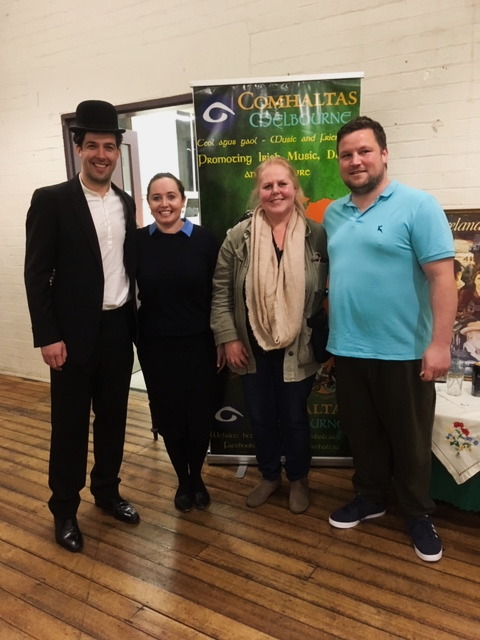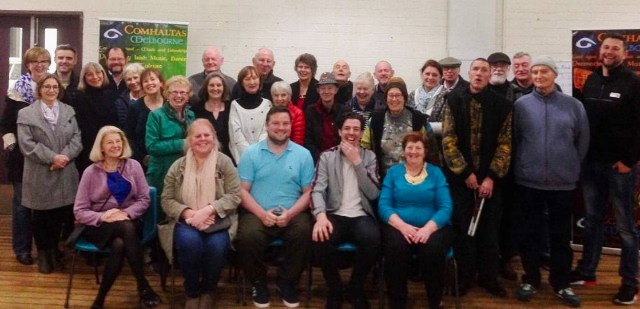Fáilte
Fáilte romhat go suíomh gréasáin Chumann Gaeilge na hAstráile. Tugaimid aitheantas do na pobail Bhundúchasacha is pobail an Chaolais Torres mar úinéiri agus mar chaomhnóirí traidisiúnta na talún ar fud na hAstráile, go háirithe anseo i Melbourne, do na pobail Wurundjeri agus Bunurong, cuid de na náisiúin Kulin. Níor géilleadh a ndúichí riamh. Tugaimid ómós dá seanóirí a bhí agus atá ann fós.
Is í príomhaidhm an chumainn ná teagasc (agus foghlaim) na Gaeilge. Bíonn ranganna ar siúl oíche Dé Máirt (Dé Céadaoin ar Zúm) le linn na dtéarmaí scoile Victoria agus reáchtáilimid scoil samhraidh i mí Eanáir freisin. Más comhrá atá uait, tagann ciorcail chomhrá le chéile ar an chéad Aoine agus an dara Domhnach den mhí. Bíonn ócáidí sóisialta eile ann i rith na bliana agus foilsímid nuachtlitir gach ráithe.
Anseo is féidir leat teagmháil a dhéanamh linn, clárú leis an suíomh seo agus páirt a ghlacadh san fhóram, ach más maith leat teacht chuig na ranganna is riachtanach ballraíocht den chumann a ghlacadh. Mar bhall den chumann, beidh réimsí eile den suíomh ar fáil duit freisin.
Welcome to the website of the Irish Language Association of Australia. We acknowledge the Aboriginal and Torres Strait Islander communities as owners and traditional custodians of the land of Australia, particularly, here in Melbourne, the Wurundjeri and Bunurong peoples, part of the Kulin nations. Their homelands were never ceded. We pay our respects to their elders, past and present.
The association’s primary aim is the teaching (and learning) of Irish. Classes are run on Tuesday nights (Wednesday on Zoom) during the Victorian school terms and we also have a summer school in January. If it’s conversation you’re after, conversation circles meet on the first Friday and second Sunday of the month. There are other social events during the year and we publish a newsletter each quarter.
Here you can get in contact with us, register with the website and participate in the forum, but if you want to come to classes you will need to become a member. As a member of the association, you will also gain access to other parts of the website.
- Details
- Written by: Riarthóir
- Category: Eolas
- Hits: 8052
Ranganna · Classes
Our classes are held on Tuesday & Wednesday nights during the Victorian school term (except public holidays), starting at 7:30 pm and finishing between 8:30 & 9 pm, depending on the class.
In 2023, Tuesday Beginners and Intermediate classes will return to the Kathleen Syme Library in Carlton, but the Advanced class remains on Zoom. Wednesday (Zoom) classes are primarily for people who live outside Melbourne or have trouble getting to a class and they remain on Zoom.
| Tuesday | Beginners Intermediate |
Carlton |
| Advanced | Zoom | |
| Wednesday | Beginners Intermediate |
Zoom |
You’re welcome to try a class before committing, but get in touch first. All continuing students are expected to become members of the Cumann ($45 per year). In addition, we offer our teachers an honorarium for their hard work and to help finance that and room bookings we charge students $40 per term. This is roughly equivalent to the money that was collected at physical classes at the Celtic Club.
Terms
We follow school terms, but finish a bit earlier in December. Two public holidays fall on Tuesdays this year, so there will be no class on 25 April (ANZAC Day) or 7 November (Melbourne Cup Day) as the library is not available.
| Term 1: | 31 January – 4 April |
| Term 2: | 2 May – 20 June |
| Term 3: | 11 July – 12 September |
| Term 4: | 3 October – 5 December (12 December — Christmas party) |
Textbooks
Books are sold at cost price, which at our last purchase was $50 for Gaeilge gan Stró Beginners Level and $65 for Lower Intermediate Level.
Zoom
Although you can join a Zoom meeting using only a web browser, it is recommended that you get the Zoom app (Windows, Mac, Linux, Android, iOS). If you can manage it, headphones with a microphone will make it much easier to hear and be heard. Classes starts at the same time (7:30 pm), but run for about an hour and a quarter.
Payments
Payments to us can be made by bank transfer…
Irish Language Association of Australia
Credit Union Australia
BSB: 814-282 Account No: 10597015
PayID: Tá an seoladh ríomhphoist seo á chosaint ó róbait thurscair. Tá ort JavaScript a chumasú le hamharc air.
or via PayPal. Remember to include a note saying what the payment is for and your name.
If you have any questions about classes please Tá an seoladh ríomhphoist seo á chosaint ó róbait thurscair. Tá ort JavaScript a chumasú le hamharc air., giving an indication of your level of Irish (beginner, intermediate, advanced). If you’re interested in helping with teaching, you’d be very welcome too.
- Details
- Written by: Riarthóir
- Category: Ranganna
- Hits: 10732
Barney Devlin Memorial Scholarship
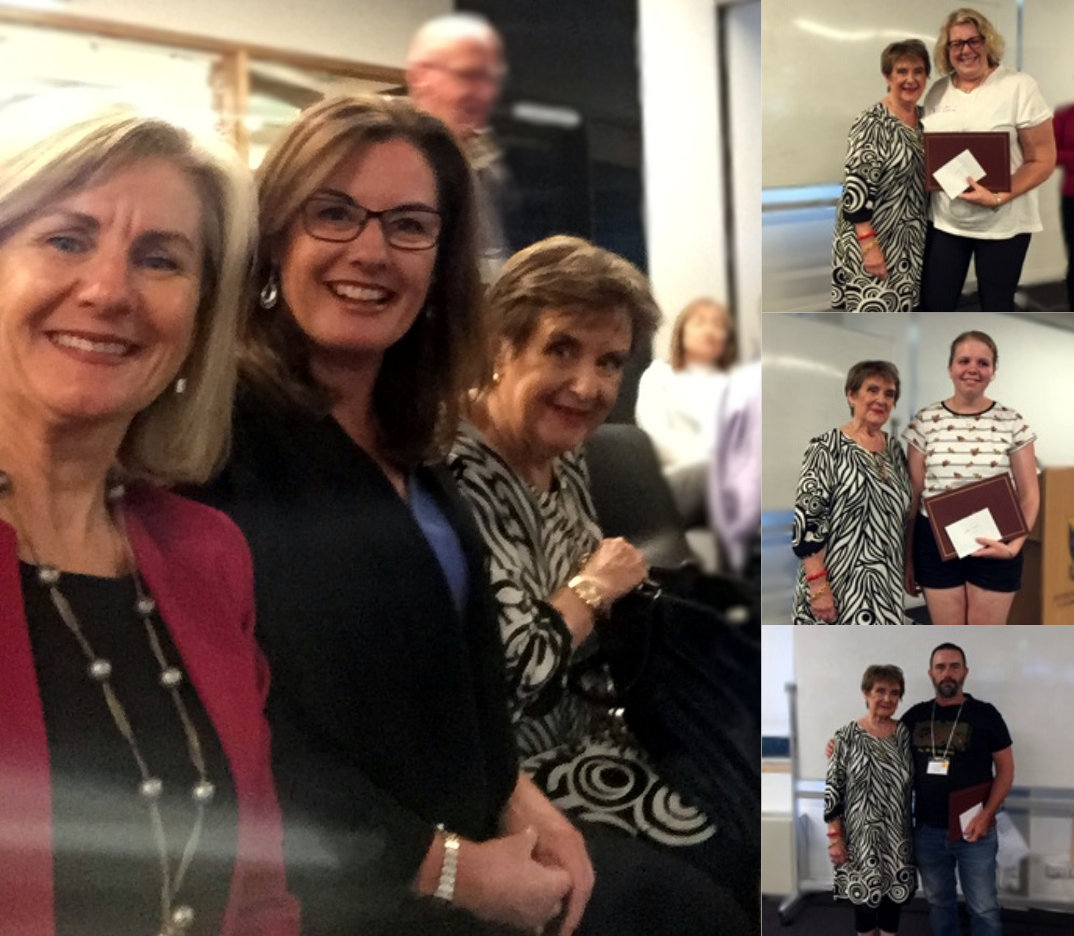
Bhí clú ar leith ag Bearnaí Ó Doibhlin i measc foghlaimeoirí na Gaeilge san Astráil mar mhúinteoir tarraingteach tiomanta agus go háirithe de bharr a chuid drámaí greannmhara (m.sh. An tAthair Ted is an Tada Fada, Cupán le Van). Nuair a cailleadh é sa bhliain 2018, thiomnaigh a theaghlach scoláireacht ina chuimhne le bronnadh ar daltaí díograiseacha na Gaeilge. Bronnadh na chéad ghradaim ag Gaeltacht Melbourne 2020 (ár scoil samhraidh), ach tar éis teacht COVID agus cealú GM 2021, is oth linn a rá nár shocraíomar na gradaim dheiridh chomh luath agus ba cheart.
Tá áthas orainn a fhógairt anois go mbronnfar duaiseanna $200, $100 agus $50 i mí Eanáir 2022. Bronnfar na gradaim ag ócáid ag an deireadh seachtaine 22-23 Eanáir. Chun iarratas a dhéanamh, líon isteach an fhoirm seo (leagan Word | leagan PDF) agus seol í ar ais chuig an seoladh ríomhphoist luaite.
Barney Devlin was well known to Australian Irish learners as a dedicated and engaging teacher, and especially for his humorous plays in Irish (e.g. An tAthair Ted is an Tada Fada, Cupán le Van). When he passed away in 2018, his family dedicated a scholarship in his memory to be awarded to dedicated Irish learners. At Gaeltacht Melbourne 2020 (our summer school), the first awards were made, but with the arrival of COVID and the cancellation of GM 2021, we’re sorry to say we’ve been slow to arrange the final awards.
We’re pleased to announce that awards of $200, $100 and $50 will be made in January 2022. This will be made at an event over the weekend of 22-23 January. To apply, just fill in this application (Word version | PDF version) and return it to the e-mail address on the form.
- Details
- Written by: Riarthóir
- Category: Nuacht
- Hits: 3635
Cúrsa Choláiste na Rinne ar líne • Online course

Tá Coláiste na Rinne ag reachtáil cúrsaí ar líne bunaithe ar chláir agus ábhair Theastas Eorpach na Gaeilge (TEG). Tá dhá leibhéal ann faoi láthair: cúrsa (TOSÚ) do thosaitheoirí agus cúrsa (FEABHSÚ) atá oiriúnach do dhaoine a bhfuil suim acu an teastas TEG B1 a bhaint amach (nó a bhfuil ag iarraidh an leibhéal sin a bhaint amach).
Tá uaireanta na gcursaí seo dírithe ar fhoghlaimeoirí sna S.A.M. ach b’fhéidir rang a chur ar fáil d’fhoghlaimeoirí Astrálacha más féidir cúigear daltaí a fháil a mbeadh toilteanach clárú. Sin an aidhm atá ag Jennifer Keogh agus James Krumrey-Quinn—cúigear daltaí a chlárú don chúrsa FEABHSÚ (TEG B1). Mairfeadh an cúrsa 8 seachtain ag tosú Déardaoin 6 Bealtaine (nó 4 Meitheamh) ag 7:00 pm AEST agus chosnódh sé €180. Ochtar an líon is mó a bheadh sa rang.
Coláiste na Rinne is running online courses based on the structure and content of the Teastas Eorpach na Gaeilge (European Certificate in Irish). There are two levels: beginners (FIRST STEPS) and a course (MAKING PROGRESS) suited to people interested in achieving the TEG B1 certificate (or getting to that level).
The hours of the courses are focused on learners in the U.S. but it would be possible to put on a course for Australian learners if five students could be found who were prepared to register. That’s the aim of Jennifer Keogh and James Kumrey-Quinn—to register five students for the MAKING PROGRESS course (TEG B1). The course would last 8 weeks, starting on Thursday 6 May (or 4 June) ag 7:00 pm AEST and it would cost €180. The maximum number of people in the class would be eight.
- Details
- Written by: Riarthóir
- Category: Nuacht
- Hits: 4912
From Roscrea to Beagle Bay
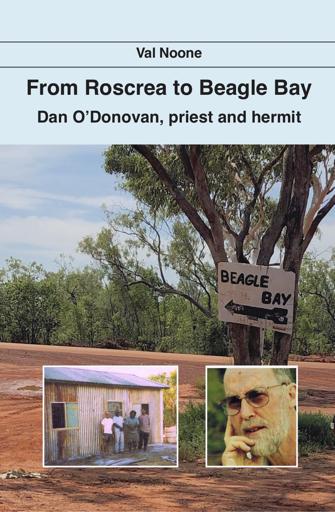
A new book by historian (and long-term member of the Cumann) Dr. Val Noone is to be launched on St. Patrick’s Day. From Roscrea to Beagle Bay: Dan O’Donovan, priest and hermit is a tribute to a remarkable Irish monk who has lived much of his life in Australia.
An unusual Irish monk. Born in Berlin in 1934 where his father was chargé d’affaires for the Irish government, Father Dan O’Donovan joined the Cistercian order of monks at Roscrea, County Tipperary, and came to Tarrawarra Abbey, Victoria, Australia, in the 1960s, and in 1972 answered a call from the Benedictines of New Norcia to work in the Kimberleys.
Dan has spent the past 47 years in northwestern Australia, first as a Cistercian monk with approval to live outside his monastery, and later as a priest of the Broome diocese. Dan is exceptional for his stints as a hermit, living adjacent to and in friendship with Indigenous communities – six years at Lombadina and twenty at Beagle Bay.
This booklet is a tribute to Dan as he begins his third year of retirement at Germanus Kent House in Broome. In April 2019, urged on by friends of Dan, Val Noone of Melbourne travelled to Broome, interviewed Dan and spent some days researching his papers. This is the result: an introduction to Dan’s story.
University of Divinity, and Margaret Hill, cousin
contact
- Details
- Written by: Riarthóir
- Category: Imeachtaí
- Also available: ga-IE Gaeilge
- Hits: 2677
Dangerous diacritic in the hands of a child!
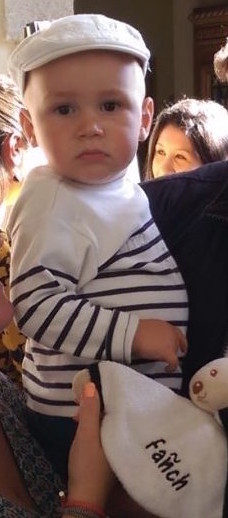
After a long period of cases and appeals in the courts, Fañch Bernard, two and a half years old now, was allowed to use his Breton name with a tilde (~) as it is spelled in that language.
When the young boy was born in May 2017, a government official refused to register his name with the ñ because the tilde wasn’t part of the French language and he wrote “Fanch” on the birth certificate. A more senior official reversed the decision, but prosecutors took the case to the Kemper (Quimper) local court and they confirmed the original decision again i September 2017. According to the local court, it would be a breach of “the will of our state of law to maintain the unity of the country and equality for all regardless of origin” to allow the little mark to be written officially.
By that time though, little Fañch already had a I.D. card and passport with the troublesome ñ on them.
In the end, the case came before the Appeals Court of Roazhon (Rennes) last October and they allowed the sign. They found that the tilde was not unknown in the history of the French language and in addition the name Fañch had already been accepted by a prosecutor in Roazhon in 2002 and a registrar in Paris in 2009.
There are a couple of well-known Breton writers with the name — Fañch Peru and Fañch Broudig. Also, the tilde can be regularly seen in the surname of the junior Minister for the Interior — Laurent Nuñez.
Fañch’s parents are happy of course — they only wanted to name their child after his grandfather — and the French Republic hasn’t falled apart.
- Details
- Written by: Riarthóir
- Category: Nuacht
- Also available: ga-IE Gaeilge
- Hits: 2988
Aisteoirí ar aistear ~ Visiting actors
Le déanaí, thug beirt aisteoir Éireannach cuairt ar Chomhaltas Ceoltóirí Éireann anseo i Melbourne. Thug Edwin Mullane léiriú ar “The Little Cloud” ó Dubliners le James Joyce, chun aitheantas a thabhairt do Bloomsday. Is comhbhunaitheoir The Corps Ensemble é Edwin agus tá sé ina stiúrthóir ealaíne don chompántas sin faoi láthair.
Is fearr aithne ar John Connors as an dráma RTÉ Love/Hate. Léirigh sé dráma aonair, Ireland’s Call, in St. Kilda agus Bondi le linn a thurais, cé nach raibh an bheirt acu san Astráil ach cúig lá!
I láthair freisin, bhí Éadaoin O’Reilly (Irish Film Festival Australia) agus iar-Uachtarán an Chumainn, Karolyne McDermott Paron. Bhain an lucht féachana an-sult as an seó.
Recently, two Irish actors visited Comhaltas Ceoltóirí Éireann here in Melbourne. Edwin Mullane gave a rendition of “The Little Cloud” from Dubliners by James Joyce, as an acknowledgement of Bloomsday. Edwin is co-founder of The Corps Ensemble and the company’s current artistic director.
John Connors is best know for the RTÉ drama Love/Hate. He staged a one-man play, Ireland’s Call, in St. Kilda and Bondi, even though the two actors were only in Australia five days!
Also present were Éadaoin O’Reilly (Irish Film Festival Australia) and ex-President of the Cumann, Karolyne McDermott Paron. The audience enjoyed the show very much.
- Details
- Written by: Riarthóir
- Category: Imeachtaí
- Hits: 8135
Page 1 of 2
